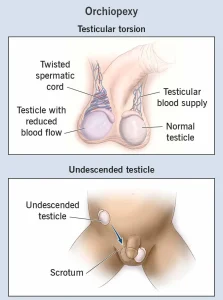Overview
An undescended testicle, also known as cryptorchidism, is a condition in which one or both testicles fail to move down into the scrotum before birth. Normally, the testicles develop in the abdomen and descend into the scrotum during the final months of pregnancy. This condition is common in premature infants and often corrects itself within the first few months of life. If the testicle does not descend on its own, medical treatment may be required to reduce future health risks.
Symptoms
Undescended testicles often do not cause pain or noticeable symptoms, especially in infants. The condition is usually identified during a physical examination.
Common signs may include:
-
Absence of one or both testicles in the scrotum
-
Uneven or underdeveloped scrotum
-
Testicle felt in the groin but not in the scrotum
-
Rare discomfort in older children or adults if untreated
In some cases, the testicle may move temporarily into the scrotum and then retract, known as a retractile testicle.
Causes
The exact cause of an undescended testicle is not always known. It is believed to involve a combination of hormonal, genetic, and environmental factors affecting fetal development.
Possible causes include:
-
Hormonal imbalance during pregnancy
-
Problems with testicular development
-
Genetic conditions affecting growth
-
Physical blockage along the normal descent path of the testicle
Risk Factors
Certain factors increase the likelihood of a baby being born with an undescended testicle.
Risk factors include:
-
Premature birth
-
Low birth weight
-
Family history of undescended testicles or genital abnormalities
-
Maternal health conditions such as diabetes
-
Exposure to tobacco smoke, alcohol, or certain chemicals during pregnancy
Complications
If left untreated, an undescended testicle can lead to long-term health issues, particularly after childhood.
Possible complications include:
-
Reduced fertility or infertility due to impaired sperm production
-
Increased risk of testicular cancer later in life
-
Testicular torsion, which is twisting of the spermatic cord
-
Inguinal hernia
-
Psychological or self-esteem concerns related to appearance
Early treatment significantly lowers the risk of these complications.
Prevention
There is no guaranteed way to prevent an undescended testicle, as it develops before birth. However, certain steps during pregnancy may help reduce risk.
Preventive measures may include:
-
Receiving regular prenatal care
-
Avoiding smoking, alcohol, and recreational drugs during pregnancy
-
Managing chronic health conditions such as diabetes
-
Minimizing exposure to harmful environmental chemicals
Early diagnosis and timely treatment, usually within the first year of life, are key to promoting normal development and reducing future health risks.
Advertisement

